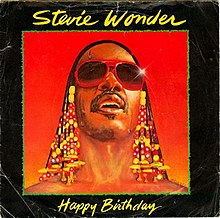Happy Birthday (Stevie Wonder song)
- This song has no relation to the song traditionally sung on people's birthdays.
| "Happy Birthday" | ||||
|---|---|---|---|---|
 UK single picture sleeve | ||||
| Single by Stevie Wonder | ||||
| from the album Hotter than July | ||||
| B-side |
| |||
| Released | June 26, 1981[1] | |||
| Recorded | 1980 | |||
| Genre | Pop, R&B | |||
| Length | 5:53 | |||
| Label | Motown | |||
| Songwriter(s) | Stevie Wonder | |||
| Producer(s) | Stevie Wonder | |||
| Stevie Wonder singles chronology | ||||
| ||||
"Happy Birthday" is a song written, produced and performed by Stevie Wonder for the Motown label. Wonder, a social activist, was one of the main figures in the campaign to have the birthday of Martin Luther King Jr. become a national holiday, and created this single to promulgate the cause.[2] The song has since become a standard for use during birthdays in general, particularly among African-Americans.
"Happy Birthday" was released as the fourth single of Wonder's Hotter than July (1980) album in June 1981. It was one of his most popular entries in the UK Singles Chart.[3] It was not released in the United States, but is still regarded as one of his signature songs.
Background
The song, one of many of Wonder's songs to feature the use of a keyboard synthesizer, features Wonder lamenting the fact that anyone would oppose the idea of a Dr. King holiday, where "peace is celebrated throughout the world" and singing to King in the chorus, "Happy birthday to you". The holiday, he proposes, would facilitate the realization of Dr. King's dreams of integration and "love and unity for all of God's children".
Wonder used the song to popularize the campaign, and continued his fight for the holiday, holding the Rally for Peace Press Conference in 1981. United States President Ronald Reagan approved the creation of the holiday, signing it into existence on November 2, 1983. The first official Martin Luther King Jr. Day, held the third Monday in January of each year, was held on January 20, 1986, and was commemorated with a large-scale concert, where Wonder was the headlining performer.
"Happy Birthday" was released as a single in several countries. In the UK, the song became one of Wonder's biggest hits, reaching number two in the charts in 1981.[3]
When Wonder performed the song at Nelson Mandela Day at Radio City Music Hall on July 19, 2009, he slightly changed the lyrics, "Thanks to Mandela and Martin Luther King!" in the second verse. Wonder also performed this song at the Diamond Jubilee Concert in London for the Diamond Jubilee of Elizabeth II.[4]
Personnel
- Stevie Wonder – vocals, synthesizer, drums, background vocals, ARP synthesizer, keyboards, bass melodeon
Charts
| Chart (1981) | Peak position |
|---|---|
| Australia (Kent Music Report)[5] | 31 |
| Belgium (Ultratop 50 Flanders)[6] | 13 |
| Ireland (IRMA)[7] | 5 |
| Israel (IBA)[8] | 1 |
| Netherlands (Dutch Top 40)[9] | 10 |
| Netherlands (Single Top 100)[10] | 12 |
| New Zealand (Recorded Music NZ)[11] | 23 |
| Switzerland (Schweizer Hitparade)[12] | 8 |
| UK Singles (OCC)[13] | 2 |
| West Germany (GfK)[14] | 18 |
| Zimbabwe (ZIMA)[15] | 20 |
| Chart (1999) | Peak position |
|---|---|
| US Hot R&B/Hip-Hop Songs (Billboard)[16] | 70 |
Certifications
| Region | Certification | Certified units/sales |
|---|---|---|
| United Kingdom (BPI)[17] | Gold | 400,000‡ |
|
‡ Sales+streaming figures based on certification alone. | ||
References
- ^ "Stevie Wonder - Happy Birthday".
- ^ "MLK Day: Why on Monday and what was Stevie Wonder's role?". USA TODAY. Retrieved 2016-01-18.
- ^ a b "Stevie Wonder – Singles". Official Charts. Retrieved February 1, 2020.
- ^ "Stars perform at Diamond Jubilee concert". BBC News. 2012-06-04. Retrieved 2012-06-06.
- ^ Kent, David (1993). Australian Chart Book 1970–1992 (illustrated ed.). St Ives, N.S.W.: Australian Chart Book. ISBN 0-646-11917-6.
- ^ "Stevie Wonder – Happy Birthday" (in Dutch). Ultratop 50.
- ^ "The Irish Charts – Search Results – Happy Birthday". Irish Singles Chart.
- ^ "Israel Singles Charts 1987-1995". www.ukmix.org. Retrieved 6 September 2020.
- ^ "Nederlandse Top 40 – Stevie Wonder" (in Dutch). Dutch Top 40.
- ^ "Stevie Wonder – Happy Birthday" (in Dutch). Single Top 100.
- ^ "Stevie Wonder – Happy Birthday". Top 40 Singles.
- ^ "Stevie Wonder – Happy Birthday". Swiss Singles Chart.
- ^ "Stevie Wonder: Artist Chart History". Official Charts Company.
- ^ "Offiziellecharts.de – Stevie Wonder – Happy Birthday" (in German). GfK Entertainment charts.
- ^ Chartsventes (2015-09-08). "World singles charts and sales TOP 50 in 58 countries: Stevie WONDER". World singles charts and sales TOP 50 in 58 countries. Retrieved 2020-09-06.
- ^ "Stevie Wonder Chart History (Hot R&B/Hip-Hop Songs)". Billboard.
- ^ "British single certifications – Stevie Wonder – Happy Birthday". British Phonographic Industry. Retrieved February 12, 2021.
